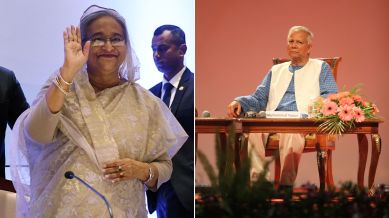Stay updated with the latest - Click here to follow us on Instagram
Bangaldesh’s Yunus may step down but how did the country reach this point: A timeline of critical events that unfolded in a year
After Sheikh Hasina's ouster, Muhammad Yunus vowed to bring major reforms in key sectors, but failed to do so amid growing political disagreement.

Bangladesh Chief Adviser Muhammad Yunus has threatened to step down, according to reports, putting the onus on political parties to agree on reforms that citizens await with growing impatience. The country, once hailed for its promising economic growth and social progress, is now grappling with rising tensions that stem from political polarisation, economic disparities, and social unrest. Its political landscape has been dented by intense rivalry and several protests, which at times have turned violent. The most significant turbulence in the scene was Sheikh Hasina’s dramatic ouster in August 2024, which put an end to her 15-year rule.
Sheikh Hasina’s ouster- A breakdown of the situation
monthly limit of free stories.
with an Express account.
What started as student-led protests against a government job quota system escalated to violent clashes and unrest that forced the then-prime minister of the country to flee to India. Following this, the military declared it would form an interim government, which is now helmed by Nobel peace laureate Muhammad Yunus.
Timeline of events
July 1
The university students took to the streets, constructing barricades and blocking roads and railway lines to demand reforms to the quota system for coveted public sector jobs. The protests were aimed at challenging the existing system, which they felt was unfair and limited opportunities for deserving candidates.
July 16
The violence intensified as the protesters and pro-government supporters threw bricks at each other and fought with sticks, claiming six lives.
July 18
Protesters torched the headquarters of state broadcaster Bangladesh Television along with several other government buildings, chanting “down with the dictator”, hours after Hasina called for peace, warning that every “murder” in the protests would be punished.
By then, at least 32 people had lost their lives and a hundred others were injured.
July 21
Bangladesh’s Supreme Court ruled that the decision to reintroduce job quotas was illegal.
However, this did not stop the protesters as their demands to fully abolish the reserved jobs for children of “freedom fighters” from Bangladesh’s 1971 independence war against Pakistan were not met.
August 5
Hasina fled to India after protesters stormed her palace, with thousands celebrating.
Is Bangladesh on the verge of a coup?
Almost a year after Hasina’s dramatic fall, Muhammad Yunus’ interim government is also on the verge of collapse, according to reports.
Bangladesh’s de facto prime minister has now threatened to step down if the political parties do not give a green signal to the reforms that citizens await, news agency Reuters reported, citing a top student leader
Nahid Islam, the head of the newly formed National Citizen Party (NCP), said that it was becoming difficult for Yunus to function smoothly without the backing of political parties.
“He was visibly upset,” Islam told reporters after meeting the leader on Thursday (May 22).
“He said if he cannot do the work he was asked to do – reform the system and prepare for fair elections – then he may have to leave. He feels trapped between demands from different political camps and growing public impatience.”
He then said that elections without reform would only take the system back to where it was, battling the same issues.
“We told him clearly that people didn’t rise up just to switch governments, but to change the system,” said Islam, whose party emerged from last year’s student-led protests. “Elections without reform will only take us back to the same problems.”
This comes after the Yunus administration witnessed its first protest in Dhaka by Bangladesh Nationalist Party (BNP) supporters, demanding an election date. After Hasina’s ouster, Yunus vowed to bring major reforms in key sectors, but failed to do so amid growing political disagreement.